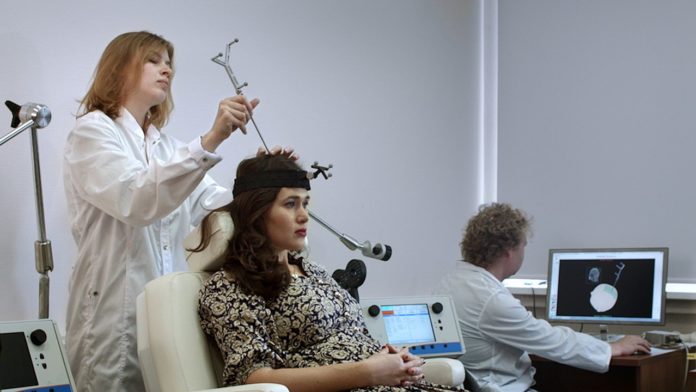Transcranial Magnetic Stimulation (TMS) that targets the memory center in brain restores age-related memory loss in older adults
Stimulating a precise location of the brain’s memory center with electromagnetic pulses improves the memory of older adults with age-related memory loss to the level of young adults, reports a new study.
“Older people’s memory got better up to the level that we could no longer tell them apart from younger people,” said lead investigator Joel Voss, associate professor at Northwestern University Feinberg School of Medicine.
The study used Transcranial Magnetic Stimulation (TMS) to target the hippocampus – the brain region that atrophies as people grow older, which is responsible for memory decline.
The study was published today in Neurology.
“It’s the part of the brain that links two unrelated things together into a memory, like the place you left your keys or your new neighbor’s name,” Voss said. “Older adults often complain about having trouble with this.”
This type of memory worsens as we age. Nearly all people experience a decline in their memory ability as they age.
24 hours after the final stimulation, the subjects were given a new memory test in which older adults scored at the level of young adults on the memory tasks
The new study of 16 people, aged 64 to 80 with normal age-related memory problems showed that it’s possible to alter memory ability in older adults using this type of brain stimulation, Voss said.
The team located the hippocampus individually for each participant with an functional MRI (fMRI). An fMRI measures how active a part of the brain is at a given time.
It isn’t possible to directly stimulate the hippocampus with TMS because it’s too deep in the brain for the magnetic fields to penetrate. So, researchers identified a superficial brain region close to the surface of the skull – behind and slightly above a person’s left ear (parietal lobe) with high connectivity to the hippocampus. Brain activity from this region is synchronized to the hippocampus suggesting that these regions pass on information.
At baseline, younger and older adults were given memory tasks in which younger adults scored about 55 percent correct and older adults less than 40 percent correct.
The research team then applied high-frequency repetitive magnetic stimulation to the spot for five consecutive days for 20 minutes a day. Stimulating this area improved the function of regions important for memory that are disrupted by aging, evident by more neural activity visible on an fMRI.
24 hours after the final stimulation, the subjects were given a new memory test in which older adults scored at the level of young adults on the memory tasks.
The study also used a fake placebo stimulation condition which did not improve memory.
Voss and colleagues will next test this approach on participants with mild cognitive impairment, the early stage of Alzheimer’s disease. They will be stimulating the brain for longer periods of time to test how long the memory improvement lasts.


